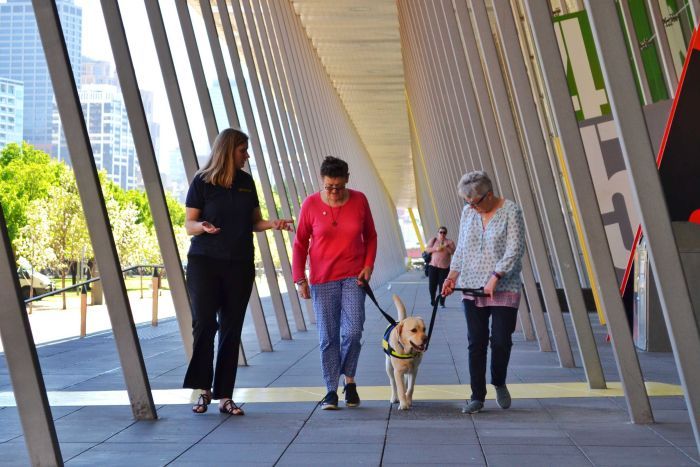General Health
Dementia dog study seeks to prove effectiveness of assistance animals
Posted
A new Australian-first study is examining the effectiveness of using assistance dogs to help people with younger onset dementia.
The research takes 20 guide dogs, normally used by visually-impaired people, and re-trains them to assist people living with the condition, as well as their carers.
It is being undertaken by The University of Melbourne, Vision Australia Seeing Eye Dogs, and Dementia Australia, and the early results are encouraging.
Edie Mayhew was diagnosed with younger onset dementia in 2010. As part of the study, she’s been paired with a white labrador called Melvin.
“I look after him and he looks after me, I reckon that’s a pretty good way to treat it,” Ms Mayhew said.
“I love him a lot.”
Ms Mayhew’s partner and carer, Anne Tudor, said life had improved since Melvin arrived about 12 months ago.

Photo:
Edie Mahew (middle) has dementia, and has been supported by her partner, Anne Tudor. (ABC News: Jonathan Hair)
“We now need to spend a lot more time at home as the dementia progresses,” Ms Tudor said.
“He makes it so much easier for us to do that.
“It’s wonderful, it’s like having a beautiful child that doesn’t cause too many hassles.”
The dogs are trained to sense mood, tone of voice and anxiety, and can also help if their owner gets lost.
Researchers involved in the study conduct lengthy interviews with participants, discussing how the dogs are making a difference.
It is estimated that more than 400,000 Australians will be living with dementia by 2020.

Photo:
Belinda Nixon said the initial results from the study showed the dogs were helping. (ABC News: Jonathan Hair)
Belinda Nixon from Dementia Australia and said the dogs were proving to be important for treatment.
“If somebody’s getting up in the middle of the night, perhaps they’re a bit disoriented, perhaps they’re going to the bathroom,” Ms Nixon said.
“The dog is able to see that the person is a little bit distressed and confused, and be able to get the family member to come and help them out.
“Caring for someone with dementia is a 24/7 job, and to be able to have some support in that, even it if is just a dog has been so helpful for these families.”
The study is expected to be completed next year.
Topics:


